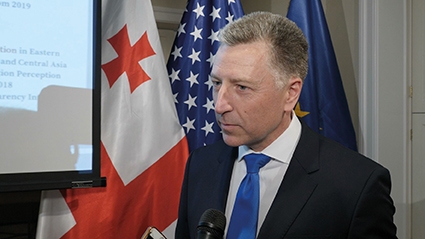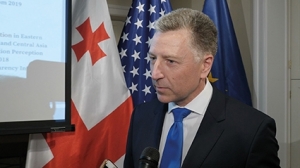Kurt Volker on Anaklia Conundrum
EXCLUSIVE INTERVIEW
As controversies surrounding the Anaklia Deep Sea port show no signs of abating, GEORGIA TODAY spoke to Kurt Volker, Executive Director of the McCain Institute for International Leadership, to find out more about what Washington and the proverbial West might be thinking about the Anaklia conundrum.
“Georgia, a small country wedged between Russia and Iran, is a potential transit hub for commerce from Central Asia to Europe and from Europe to Central Asia,” Volker tells us. “It is a way of linking Georgia’s economy to a global economy and the way of linking that economy of Central Asia to global economy through Georgia. So, it has great potential to be an additional element in creating economical alternative, stability, growth and attraction for further investment in Georgia and region. It also has tremendous potential as a project that will strategically reinforce Georgia’s independence as a growing economic power.”
Secretary of State Pompeo issued a rather blunt warning against potential Chinese interest in Anaklia Port. what did he mean and why should we be wary?
The Chinese come with cash and say they will invest, so it might prove tempting for some countries. However, China is not a democracy, it is an authoritarian government; it seeks to have a unilateral advantage economically in global trade. What they do is not about creating an open international trading order; they use preferential deals through state-owned companies to gain an advantage. It’s a real risk for countries like Georgia and accepting the funding might lead to losing a high degree of independence and potential for independent growth and prosperity.
Russia is also far from a modern democracy, but the Georgian gov’t has been encouraged to trade with them despite the ongoing conflict. How do you make the distinction?
That’s inevitable, since Russia is a neighbor. China is not a neighbor; you don’t have the natural degree of trade you have between Georgia and Russia where you have personal, historical relationships. At the same time I do think the Georgian government and people should be thinking about the future of the country, and so much of linkage to Russia’s economy is about the past, the economic ties that were developed during the Soviet period which are not necessarily favorable to Georgia, not helping it to connect to a wider global economy. By contrast, the relationship and trade with the EU, which are growing substantially, do bring Georgia into a modern global supply network. That's where the future of Georgia lies.
Let’s discuss the American interest. How would the US use the existence of such a port [Anaklia] in the region?
It’s not about the US making use of this port, it’s about Georgia. A port with deep sea capacity means that ships there will therefore be able to carry large amounts of cargo. And that means that you could take any goods anywhere: connecting Afghanistan on logistics and supplies, mining, manufactured goods, food stuff. It creates the capacity to link the region to the rest of the world and you can gain some competitive advantages for the region. The US is just one big player in the global economy that is interested in trade- we’ve seen what happened with the BTC pipeline which brought oil from Azerbaijan via Georgia to Turkey and created global interest in that energy supply.
What NATO prospects can building this port offer Georgia?
Georgia has done very well in reforming its military, contributing to security alongside NATO in places like Afghanistan. The US bilateral military relationship with Georgia has continued to develop over the past several years and Georgia has also done a lot of work in areas that are important for NATO membership and the development of democracy, market economy, law, rights of minorities, respect for neighbors and so on. In short, it has made a lot of progress. But it is not there yet and you know last year's presidential elections did not get good reviews from the ODIHR, so there’s an opportunity ahead of the 2020 elections to make this a really credible first-rate European-level parliamentary election, and the fact that it will be straight proportional representation makes it even more interesting as a potential stabilizer of Georgian democracy. The analogy I draw is that in 1999, the Baltic states were seeking NATO membership and everybody thought it was impossible; they were too close to Russia, indefensible, too costly, not ready. But by 2001 and 2002, when NATO was getting ready to enlarge again at the Prague Summit, it was impossible to think of enlarging NATO without the Baltic states because they had done the most work, they were the best performers and committed to actually developing society in the right way and being like other NATO members. It was impossible not to bring them in. Georgia is in an interesting point: it can’t join NATO today, but if things go right in the next years, it’s going to be harder and harder to say that Georgia cannot join the alliance. As for the port project, I think to the extent that it provides a source of income, growth, independence and stability, and while Georgia reinforces its capacities to be a capable country, I think it makes Georgia a stronger candidate.
Russia claims the Anaklia project could see US and NATO submarines coming in.
This is a typical example of how the Russian propaganda machine works. There’s nothing in this project that is driven by war considerations or the involvement of the US military; this is about the economic development of Georgia and region.
But doesn’t it have also a military security dimension, considering it’s a deep-sea port?
Georgia is likely going to have to invest in national security capacity itself to make sure this port is safe.
You met with Bidzina Ivanishvili earlier this year. How much does his vision for the port coincide with the US vision?
There are obviously issues around financing for the project - they say that the consortium has been unable to secure sufficient financing and they're asking too much from the government for a private project- so, conflicting narratives. I had various meetings in Georgia to learn more about it and said that for the country it is important that the project go forward. Instead of a standoff, and people arguing who's to blame, it should really be a shared interest of all Georgians that this project goes forward. Some form of public/private partnership with international investment is what's going to be needed to bring it to fruition and that's what I hope all the actors will be able to support.
What was Ivanishvili’s position? Does he agree with the US take on the port?
I don’t want to characterize his personal take on it, as I also met the Anaklia consortium and others. I did not find anyone who would disagree with the notion that the completion of this port is strategically important for Georgia. As I said, there are differences in explanations over why the financing hasn’t come together so far. But in terms of the strategic importance of completing the project and delivering it, I think everybody is in agreement.
You emphasize investor attitudes to this project. Is the Conti Group’s leaving the consortium an “incident” or a testament that some investors are worried that things are not going as well as they hoped?
You know there's a cost to money over time and if time goes by and the project is not moving ahead, an investor's going to look at it and say ‘I can't afford to leave my money on the table any longer, I've got to do something else with it.’ It’s a normal investment decision. It's unfortunate, because it was a great opportunity; now it has to be rebuilt, the opportunity has to be stitched back together, be it with this investor or another. It ought to be a signal to everybody, government, private investors and consortium alike, that they've got to work together to pull this project off. If this project does go forward successfully and external investors are able to see it come together, it’s going to be a tremendous encouragement to businesses and banks and other foreign investors to further invest in Georgia because this will create economic opportunities. On the other hand, if they’re unable to work together to create a strong public-private international partnership, it's going to have people questioning whether Georgia can pull off projects like this, can they play a bigger role or is it going to be a bit more of a backwater? I don't think Georgia is by any means destined to that kind of secondary status; I think this can be done but I think that there will be a reaction if it doesn't go forward.
There is a clash of narratives around the TBC case in reference to the Anaklia port. What do you make of it?
What this illustrates to me is that you do not have a cooperative arrangement, you don't have an agreement or a deal for public-private partnership where you have a private consortium: you have government resources and you have external investors who are still arguing with each other. Between the consortium and the government there are these conflicting narratives as to who's right, who's wrong or what's been done and what's not. I'm convinced that all of these narratives are partially true, but that's not the point. I think there are difficulties in financing because of the legal challenges going on, I think there are difficulties in securing public financing as well.
Do you believe there is also government pressure?
I don’t know. When you speak to the government, they confirm they want to see the project completed and are giving money to the project, giving time extensions to the consortium so they can raise the money needed. But what needs to happen is to move ahead: we need the private sector companies and the government and international financers to put this together as a single project.
The US Embassy voiced its concerns on the TBC case, bringing up the timing as a factor to be questioned, though the incident was said to have happened in 2008. Do you share these concerns?
I haven't seen what the US Embassy said. I've spent a lot of time in the former Soviet space and you can always find people who did something and there's some level of corruption or misjudgment or whatever it might be, and people spend a lot of time looking back and going in for retribution, political retribution of some kind. Take what happened after 2012, I think Georgia lost about three years when it could have been advancing but instead was tied in knots because of the prosecution of people from the former government. What Georgia really needs to be doing is focusing on the future rather than going back into the past digging up old cases. Just to give you another example; everyone is making a lot out of the Rustavi 2 case, where ownership has passed from former owners to previous owners. But we shouldn't confuse the two issues: one is ownership and another is the concept of free media. These things do happen- it's in everyone's interest, including the government's, to make sure there is a diversity of views expressed in free and independent media because without that it's a detriment to Georgia's democracy and aspirations as a country.
By VAZHA TAVBERIDZE











